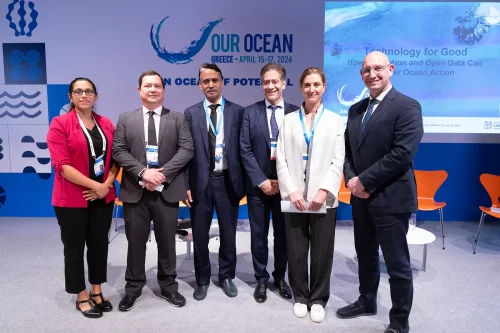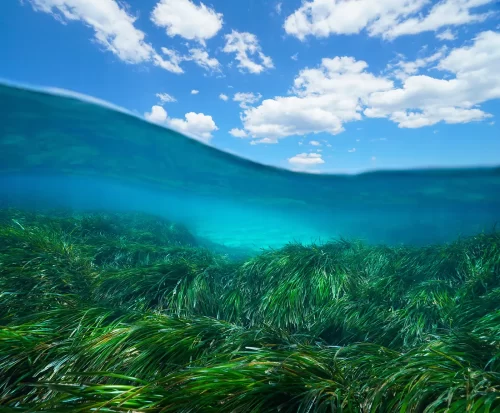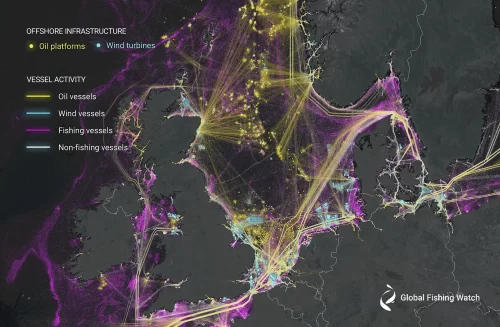-
Global Fishing Watch, Trygg Mat Tracking, Oceana, Ocean Unite and the Ocean Risk and Resilience Action Alliance are partnering to create a risk assessment tool to help insurers identify vessels at risk of illegal, unreported and unregulated fishing
-
Data-powered tool will help prevent vessels at high risk of involvement in IUU fishing operations from accessing insurance
-
Research shows that reducing access to insurance discourages vessels from participating in criminal activities
Glasgow, U.K. – An innovative risk assessment tool is being developed by the international nonprofits, Global Fishing Watch (GFW) and Trygg Mat Tracking (TMT) to help insurers combat illegal, unreported and unregulated (IUU) fishing, a critical threat to the ocean’s health and capacity to cope with climate change.
With support from Ocean Unite and backed by the Ocean Risk and Resilience Action Alliance (ORRAA), the technology will enable insurers to quickly evaluate the risk that a vessel seeking insurance may have engaged in, or supported, IUU fishing. The initiative will be announced today at a high-level roundtable co-hosted by the U.K. government and ORRAA at the 26th UN Climate Change Conference (COP26) taking place in Glasgow, U.K. The event provides a platform for governments, private sector and civil society to raise ambition to combat ocean risk and build resilience through action-oriented commitments.
Developed with funding from the Gordon and Betty Moore Foundation, the tool leverages GFW’s machine learning expertise and vessel tracking data, and TMT’s vessel identity and compliance risk data, to allow insurers to rapidly evaluate a vessel’s identification and activity information to determine IUU fishing risk and whether to provide insurance. Examples of risk indicators include whether the vessel is listed on TMT’s IUU Vessel List and suspicious activity such as frequent changes to a vessel’s flag—a flag State is the country in which a vessel is registered and is the primary authority responsible for ensuring the vessel complies with all relevant measures and laws wherever it goes.
Research has found that vessels engaged in IUU fishing often seek out insurance, even when blacklisted, which enables illegal activity while increasing risk to insurers and undermining sustainable fisheries management. Withholding insurance could make it harder for vessels to participate in IUU fishing given their high exposure to financial risk, according to a report by the ocean conservation organization, Oceana, which will provide its expertise to the initiative.
Karen Sack, Executive Director of ORRAA and CEO of Ocean Unite commented: “Illegal fishing multiplies the risk to fisheries sustainability, marine biodiversity, coastal communities and insurers. Together, with the support of the Gordon and Betty Moore Foundation, we have an opportunity to create and deploy innovative technology that will arm underwriters with the information they need to cut off access to insurance for unscrupulous actors. This will be a surgical strike in the fight to end illegal fishing.”
Tony Long, Chief Executive Officer of Global Fishing Watch added: “Open and actionable data is increasingly recognised as a powerful tool to help detect and assess risk of non-compliance in global fishing operations. It can play an important role in deterring bad behavior by vessels that seek to take advantage of the currently patchy global surveillance system.”
Dr. Dana Miller, acting Campaign Director, Illegal Fishing and Transparency at Oceana in Europe added: “IUU fishing vessels cannot operate on their own. They rely on an international network of businesses that provide them with services, including insurance. Insured IUU fishing vessels may also be purposefully sunk, and owners have attempted to whitewash the profits of IUU fishing through insurance claims. When effectively mobilized and equipped with the right tools, insurance companies can become important allies in the global fight against IUU fishing. These companies must scrutinize their contracts more closely and deny IUU fishing vessels access to their services.”
Bernd Cordes, Program Officer, Conservation and Markets at the Gordon and Betty Moore Foundation concluded: “We want fishing to be sustainable—safe, legal, profitable, equitable, and managed within ecological limits. Insurance companies provide products and services to the seafood industry that can help ensure and incentivize all of those conditions. But accurate, timely and credible data is needed to do it. ORRAA, Global Fishing Watch, Trygg Mat Tracking and Oceana are working together and with insurance industry partners to make that data uniquely available sooner rather than later.”
The tool will be developed and tested through 2022 and a technology blueprint released in 2023 along with an application programming interface (API) portal that will allow insurers to integrate the data within their existing systems. The initiative builds on a collaboration between Oceana, Ocean Unite, GFW and TMT working with insurers to identify policy solutions to reduce insurance coverage for IUU fishing vessels and follows the Insurance Industry’s Statement against IUU Fishing that was released at the Our Ocean conference in Malta, 2017.


